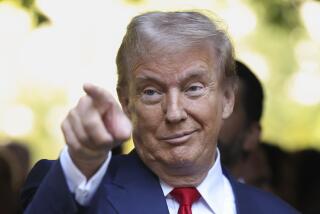World Trade Pact Backers, Foes Lobby Californians in Congress
WASHINGTON — With the new world trade agreement facing unexpectedly difficult hurdles in Congress, advocates on both sides are making the California congressional delegation the focal point of intense lobbying.
Insisting that the Administration wants the trade accord approved this year, the White House dispatched a group of top officials Wednesday to meet with members of the state delegation. Among other things, the Administration addressed fears that the accord will take a back seat to redesigning the nation’s health care system, which is clearly President Clinton’s top priority this year.
“There’s going to be no delay,” U.S. Trade Representative Mickey Kantor said. “The President has made that clear.”
The agreement would slash tariffs--the taxes imposed on imports--by as much as one-third and write new rules governing the conduct of trade with the goal of opening up markets around the world. It would take effect July 1, 1995, or perhaps sooner, if it can clear the hurdle of gaining majority approval in the House and Senate.
Opponents of the pact, including consumer advocate Ralph Nader, are trying to stir up concern in California and other states, arguing that rules and laws governing food safety, protection of workers and the environment will be overridden by the sometimes less stringent regulations of the new World Trade Organization.
A goal of the agreement, which was negotiated over a seven-year period and was signed in Morocco in April, is to limit laws that have the effect of restricting international trade.
“If you persist in pushing for congressional approval, you will put in place the mechanisms to allow federal food safety, motor vehicle safety, motor vehicle fuel efficiency and other laws to be challenged under the WTO regime,” Nader said in a letter to Rep. Robert T. Matsui (D-Sacramento), a senior member of the House Ways and Means subcommittee on trade.
Nader said the new organization, which would replace the General Agreement on Tariffs and Trade, “will be an international autocratic system of governance that subordinates standards and policies--such as health, safety, environmental and workplace conditions--beneath the dictates of foreign trade imperatives.”
Its rules, he said, “would place maximization of trade over all else, with our federal, state and local laws subject to challenge by foreign nations within secret, unaccountable panels operating from Geneva, Switzerland.”
Specifically, Nader raised the possibility that the trade agreement would hamper enforcement of the California Safe Drinking Water and Toxic Enforcement Act, regulations restricting lead in ceramics and wine and specific tax and recycling measures.
Matsui, a leading backer of the trade plan, said the new trade organization “does not affect sovereignty one bit” in the United States or California.
Describing such arguments as Nader’s as specious, Matsui told reporters that the United States, as the largest member of the World Trade Organization, would be free to ignore its dictates.
“We can go our own way,” he said. “The only sanction is we’d be kicked out of the WTO, and no one is going to kick us out.”
Rather, Matsui said, the United States would be the most likely to use provisions of the new trade agreement to force open the markets of India and other developing nations that have a history of using local laws to block U.S. products.
U.S. budget regulations remain a major obstacle to the pact. According to estimates, tariff reductions under the accord will cost the U.S. Treasury $14 billion to $18 billion over the first five years.
If U.S. budget regulations are not waived, Congress must impose higher taxes or reduce spending so the trade plan will not increase the federal budget deficit.
Proponents argue that the increased trade made possible under the pact will lead to greater tax collections. But budget regulations do not allow such income to be counted against the lost revenue.
Sen. Max Baucus (D-Mont.), chairman of the Senate international trade subcommittee, is expected to call today for the Administration and Congress to acknowledge that government will be unable politically to raise taxes or cut spending--and to instead agree to waive the budget rules.
“As we get closer to the election, the waiver begins to look more attractive,” Matsui acknowledged. But the Administration is opposed to the waiver, arguing that it would set a bad precedent, and plans to push for tax increases instead.
In a separate meeting with reporters, House Minority Whip Newt Gingrich (R-Ga.) said it would be “intellectually dishonest” to consider the trade plan as a revenue loser just because budget rules do not allow consideration of the anticipated income.
But Gingrich, whose support helped the Administration win approval last November of the North American Free Trade Agreement, said he opposes elements of the World Trade Organization plan that would give each nation one vote in its deliberations, regardless of size.
Times staff writer William J. Eaton contributed to this story.
More to Read
Get the L.A. Times Politics newsletter
Deeply reported insights into legislation, politics and policy from Sacramento, Washington and beyond. In your inbox three times per week.
You may occasionally receive promotional content from the Los Angeles Times.










